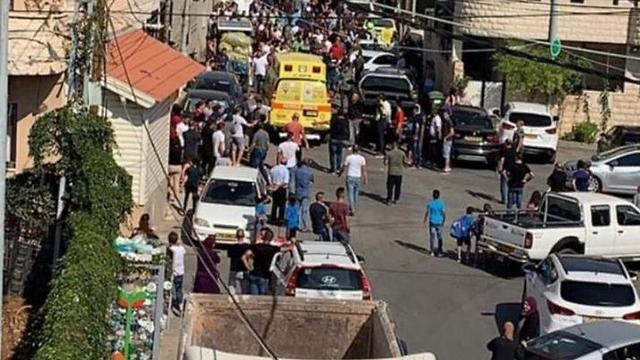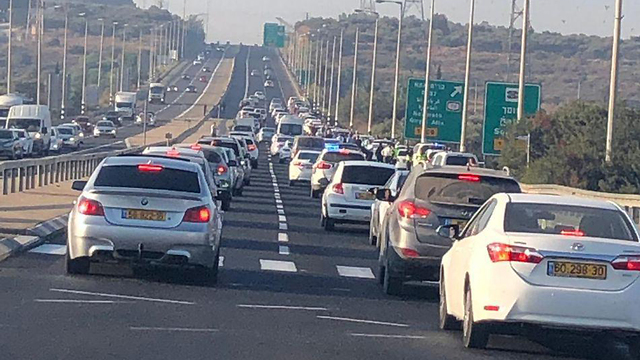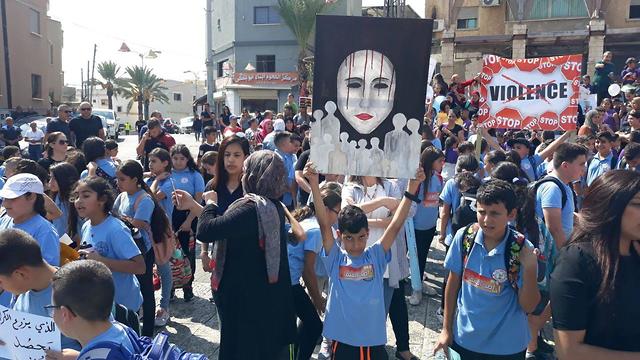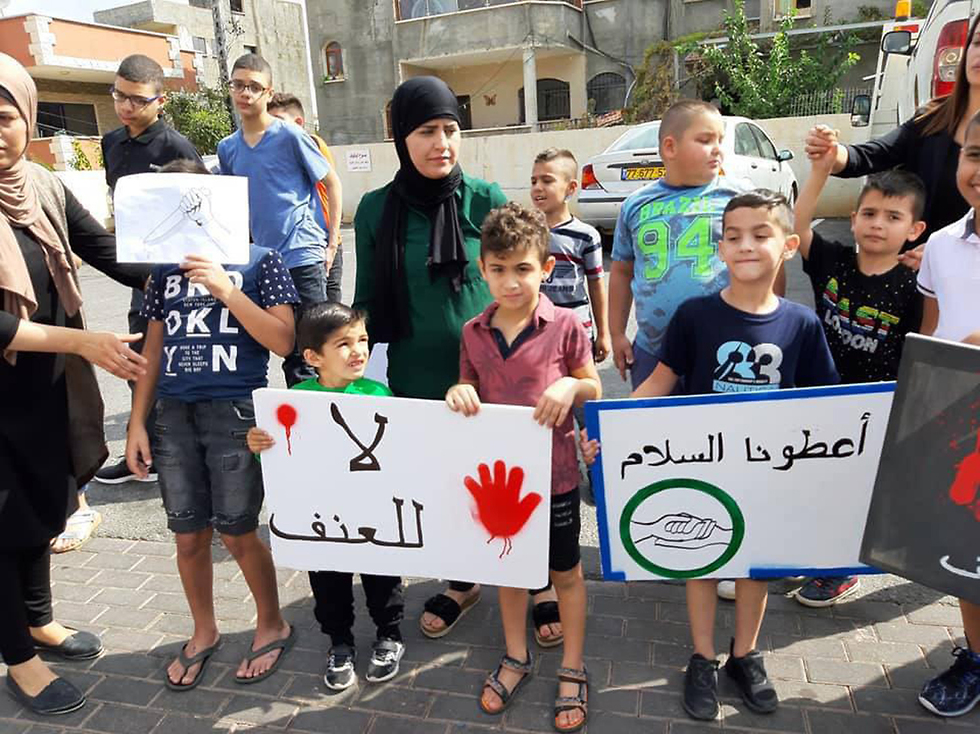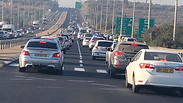
Arab MKs lead convoy to Jerusalem for ministerial meeting on violence in community
Procession of vehicles organized by NGO in protest at what it says is lack of police response to spiralling murder rate amd violent crime in sector
Members of Knesset from the Joint List of Arab parties led a convoy of vehicles from the north to Jerusalem on Thursday morning, ahead of a meeting with Public Security Minister Gilad Erdan to discuss ways to combat the rising violence in Israel's Arab communities.
The convoy of hundreds of cars was arranged by the High Follow-Up Committee for Arab citizens of Israel, a non-governmental action group made up of local Arab leaders, was in protest at what it called the police inaction to counter the violent crime.
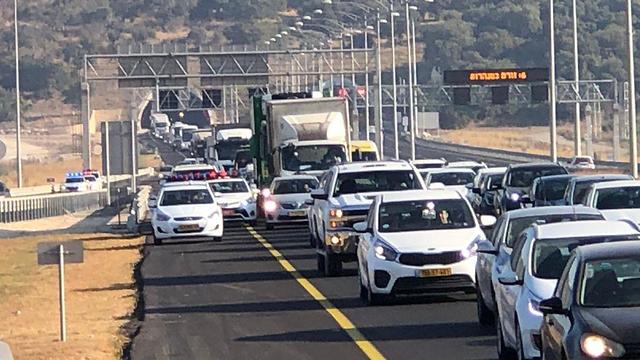
Erdan, who oversees the police force, sparked outrage Monday when he told an Orthodox radio station in Jerusalem that “Arab society, and I am sorry to say this, is very, very violent.”
“It’s connected to the culture there. A lot of disputes that end here with a lawsuit, there they pull out a knife and a gun,” he said.
He later walked back the remarks, tweeting that the “main responsibility” for fighting crime lies with the government and police, and describing the Arab public as “normative and law-abiding.”
Member of Knesset and head of the Joint List, Ayman Odeh said "We demand laws that will ensure prison time and heavy fines for any civilian who is in possession of illegal weapons" adding "this is a battle for basic rights of civilians: the right to live in security."
Since the deaths of three men last week in a midday shootout in the Arab town of Majd al-Krum in northern Israel, the country has seen mass protests, complaints of police negligence and a public debate about violence in Arab communities that has veered into racist generalizations.
The recent spike in killings within Arab towns has exposed the longstanding mistrust between the marginalized community and Israeli authorities, with each side accusing the other of neglecting the problem. Since the start of the year, more than 70 people have been murdered in violent attacks in the Arab c ommunity.
Arab citizens say Israel’s vaunted security forces are suspiciously powerless when it comes to combatting violence in their communities. Police say local leaders and residents must do more to help them impose law and order.
The debate was reignited last week by the shootout in Majd al-Krum, which killed two brothers, Ahmed and Khalil Manaa, and a third man, Mohammed Sabea. Another Manaa brother was wounded and remains in hospital, and a fifth man is said to be on the run. The police have opened an investigation but refuse to provide any details.
“They loved everyone, and everyone loved them,” Aisha Manaa said as she sobbed and held a picture of her two slain sons, one of whom is survived by a wife and two small children. “How can something like this happen?”
Israel’s Arab citizens make up 20% of the population but account for more than half of all murder victims nationwide. At least 71 Arabs have been killed so far this year, nearly as many as in each of the preceding two years, putting it on track to be the deadliest year in at least a decade.
Last month a stray bullet killed a 21-year-old pregnant mother at a wedding outside the northern city of Haifa.
Police say a shooting late Tuesday in Jaljulia, a small Arab town in central Israel, left one person dead and another moderately wounded. Local media have aired surveillance footage from other areas showing masked gunmen firing at each other with assault rifles in broad daylight.
“Children go to school and they are terrified,” Manaa said. “We are afraid during the day and during the night. It is not safe anymore.”
The police say they are doing everything they can, from stepping up patrols to opening new stations in Arab communities.
Police spokesman Micky Rosenfeld said they have confiscated more than 3,500 illegal weapons and arrested more than 2,500 people on weapons charges this year alone.
On Wednesday, police announced a major weapons' bust in which they seized 200 guns as well as dozens of grenades and explosives.
“The Israeli police can respond to hundreds of incidents, as we do,” Rosenfeld said. “But of course, we have to make sure that the leaders of the different communities are speaking to the youngsters, are speaking to the local residents, are making sure that at local weddings, you don’t have men that are turning up, using weapons and firing openly.”
The Joint List of Arab political parties, which emerged as the third largest voting bloc in the Knesset in last month’s national elections, slammed Erdan’s “racist” remarks, saying “the problem is not in the culture but in the policies.
” It pointed to a series of large protests held in Arab towns in recent days condemning both the violence and the police response.
The mutual mistrust is rooted in the Middle East conflict.
Arab citizens have close family ties to the Palestinians in the occupied territories and largely identify with the Palestinian cause.
In recent years, Israeli police have tried to boost Arab recruitment , but only a small number have joined, and many in the community continue to see the Israeli security apparatus as a hostile force.
Many Israelis in turn view Arabs with suspicion, and in recent elections Prime Minister Benjamin Netanyahu and other politicians branded Arab citizens as traitors or terrorists.
The two families involved in the shootout in Majd al-Krum know each other and even visited each other’s mourning tents.
Mohammed Manaa, the brothers’ uncle and a former head of the local council, acknowledges that the community bears some responsibility for the spike in violence.
"There’s no supervision, neither from the family, nor the local council, nor the government,” he said.
But like many Arab citizens, he sees a wide gulf between how Israel responds to threats against the state or its Jewish citizens, and its handling of violence within Arab communities.
“The Israeli government knows every detail about everything that happens inside and outside the country,” he said. “They can reach Iran, Iraq, Syria, everywhere, and they can’t remove weapons from the Arab towns?”
“They are happy with this situation, this chaos,” he added.
Manaa served on Majd al-Krum’s local council for more than two decades, and he would seem to be the kind of community leader who could help the police, but he says he has no idea what led to the shooting.
Ali Sabea, whose nephew was killed, said the young men were all friends and that he doesn’t know what caused the violence.
The Abraham Initiatives, an advocacy group that promotes coexistence between Jews and Arabs, operates in Arab communities and investigates violent incidents in order to encourage better cooperation among residents, local leaders and police.
Ola Najami-Yousef, co-manager of the group’s Safe Communities Initiative, said violence in Arab communities is rooted in years of discrimination and neglect by Israeli authorities.
“The lack of investment in the development and growth of Arab society in all fields, whether in construction, infrastructure, education, or economy, all this has led to a society that is very violent,” she said. But she said it’s unfair to hold the community fully responsible.
The police “aren’t doing their job, so they blame the victims,” she said. “It’s not the responsibility of local leaders or Knesset members to come and collect weapons from the Arab community. That’s the responsibility of the police.”










